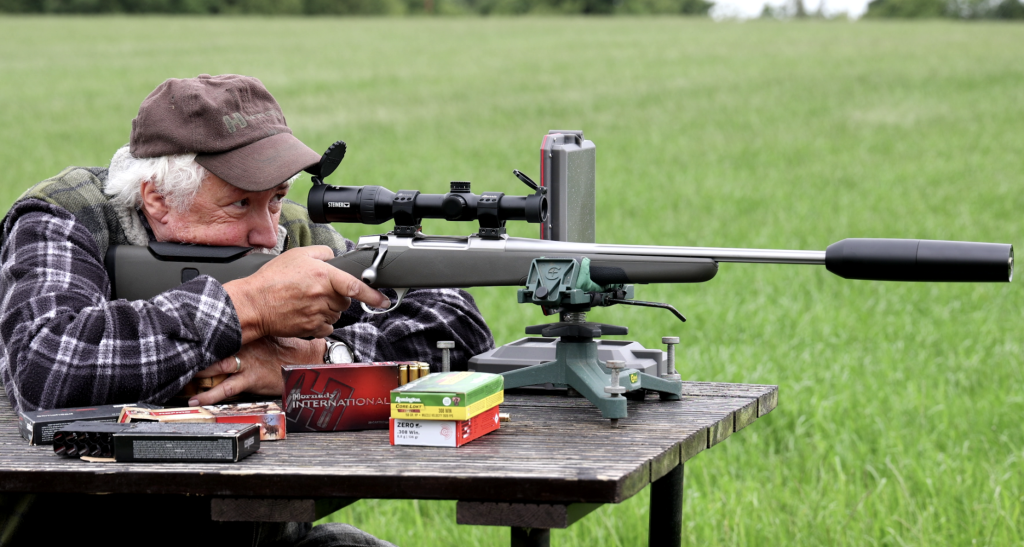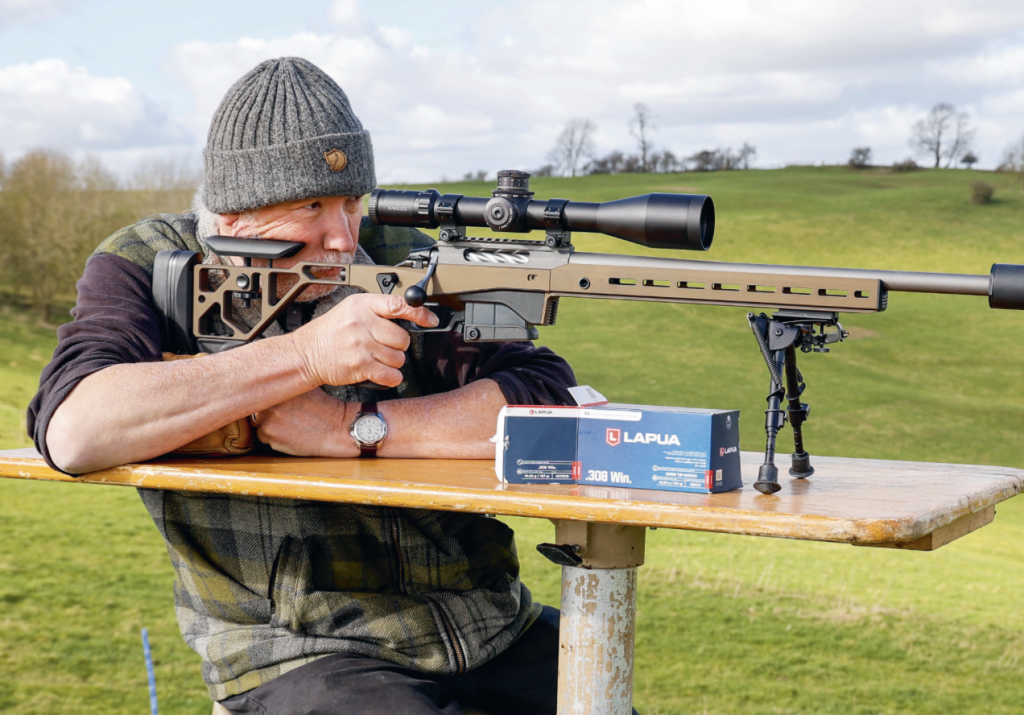THE DSC1 ADVANTAGE
Sven Hughes discovers why the DSC1 course is more than just a tick in the box for aspiring deer stalkers seeking deeper knowledge and skill
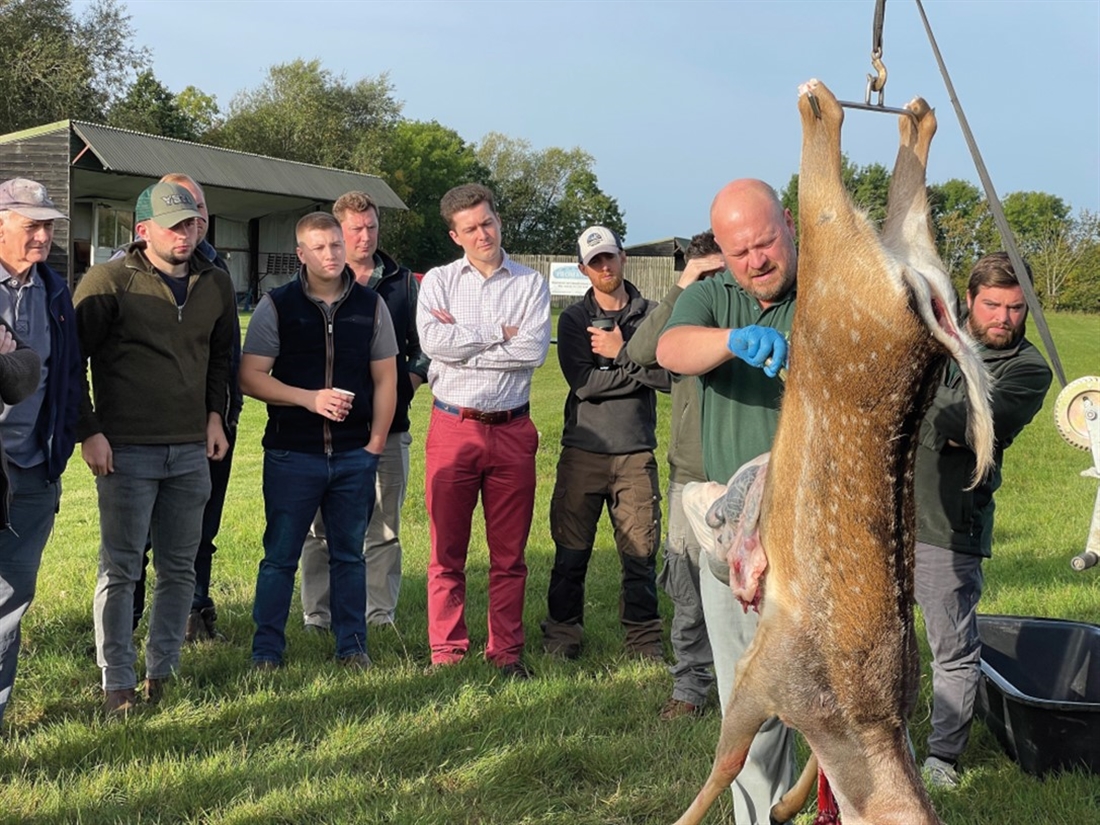
I’ve had some rather mixed results as a novice deer stalker in recent months, which I have described in previous articles for Rifle Shooter. My first guided stalk ended with me missing the deer entirely. Then I went back to school on Holland & Holland’s superb Deer Stalkers Course, before heading out again, this time guided by Venatio Sporting in Surrey, to successfully shoot my first roe buck in the middle of last year.
My erratic introduction to stalking has been hugely enjoyable, albeit sometimes rather humbling. It has also left me quite sure that I want to pursue this pastime with more determination in the years ahead, mindful of the need for ongoing training. It’s never acceptable to wander around the countryside with a rifle and just ‘have a go’, when an animal or member of the public could be injured. So like many other newbies I was recently faced with a simple choice. Should I get a DSC1 qualification or not?
WHAT IS THE DSC1?
According to the BASC website, “The Deer Stalking Certificate is … designed for any shooters who have recently taken up stalking and are seeking further advice and guidance. The course will provide an insight into, and a wider understanding of, deer stalking techniques and deer management.” All that is true, but it doesn’t begin to describe the depth and breadth of what you will actually learn.
Before attending the course, every student is provided with a Training Manual for Deer Stalkers (written and kept up to date by the British Deer Society) covering all aspects of deer ecology, firearms legislation, ballistics and so on. This is quite an intimidating wedge of facts and figures and I strongly advise you to learn as much of this core information as possible ahead of the course. There are many online resources available to help you practice the questions you are likely to face during the final written (multiple choice) exams, and they really do help.
I used the DSCT online training platform (for £40) and highly recommend it. The BDS also has its own Ultimate Deer Data online learning package (for £20), which other students told me was similarly excellent. Thirty minutes a day for two weeks ahead of your course is all you need do to pass the written assessments, including the deer recognition test.
WHO IS IT FOR?
Despite having read many books about deer stalking and ecology, watched every imaginable YouTube video and listened to every possible podcast, I still wasn’t prepared for how much of the theory I didn’t know. Yes, of course you can just go stalking with a guide and rely on their knowledge and experience to see you through, but surely the real enjoyment of deer stalking is in respecting your quarry to such an extent that you understand and anticipate its behaviour in any given season and moment.
DSC1 isn’t simply about putting a tick in a box to achieve a qualification; it’s a doorway into an entirely new relationship with this sport. New skills, but also new emotions and sensations, built on a greater understanding of and respect for our chosen quarry.
£295 for the three-day course (with an additional £90 for the optional LANTRA meat hygiene assessment) is a big outlay, but the value of the course is enormous. DSC1 provides world-class training by genuine experts in their fields. It feels good, and actually rather important, for me to know that I have now achieved the required baseline standards to consider myself a ‘hunter’ and not just a ‘shooter’ – morally as well as technically.
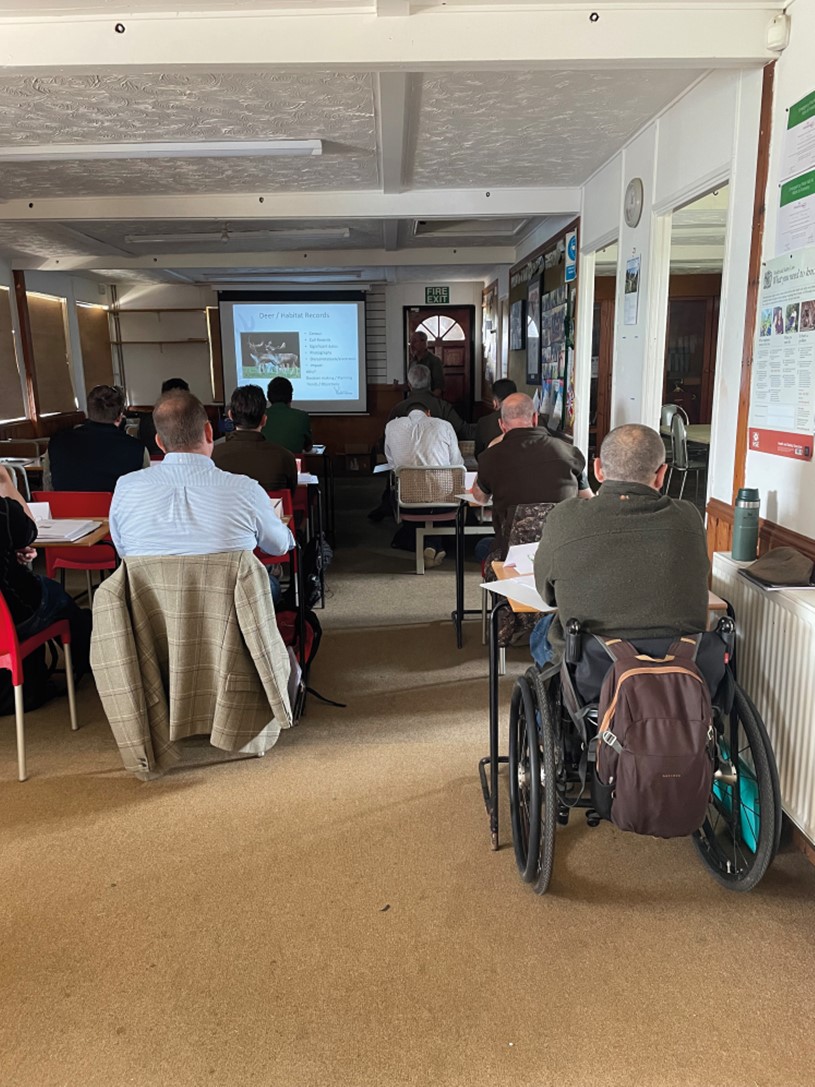
WHO ARE THE INSTRUCTORS?
The BDS course I enrolled in at Sky Park Deer Farm in Petersfield was led by one of the world’s true authorities on deer – Glyn Ingram. With over 30 years’ international deer management experience, and in addition to being a longstanding BDS trainer, Glyn is now also head ranger at Sky Park. He looks after hundreds of deer of various species and there wasn’t a deer-related question asked on the course for which he didn’t have an informed and considered answer.
Additional lessons were provided by the amiable Dominic Griffith, another seasoned BDS trainer who is also the author of the must-read book Deer Management in the UK. Again, the depth of Dominic’s knowledge was only matched by his natural ability to hold an audience.
The consequence of all this individual and combined experience was that the course covered every imaginable aspect of deer ecology, behaviour and management, interspersed with the real-world experiences and anecdotes of the instructors. Their passion was inspiring and infectious – and well beyond anything on YouTube.
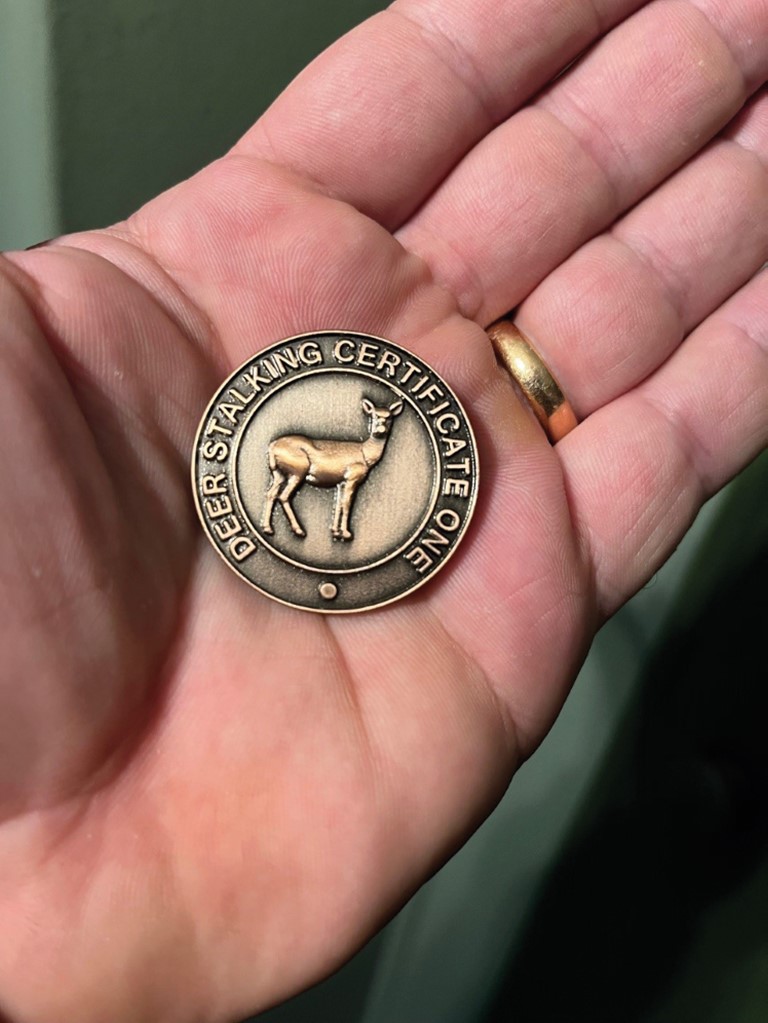
COURSE DETAILS
The course with the BDS takes three days and can be completed at several venues around the country. As I said, you will be expected to do your homework before attending. Our days started at 08:30 and generally finished around 17:00. PowerPoint lessons form the backbone of the course, with practical demonstrations of the trickier topics (gralloching, for example). There are also refresher sessions every day to ensure that students feel confident before undertaking the written assessments.
There are three main assessments – visual recognition, the main written exam, and a shooting assessment on the range – as well as the option to complete an additional written test for those wanting their meat hygiene qualification.
On completing the course, assuming you have passed, you will walk away with the Deer Management Qualifications Deer Stalking Certificate Level 1, which is the first step to showing competence in the world of deer stalking and is industry recognised. Successfully completing the course also puts you at a distinct advantage when applying for your FAC.
Although I found the BDS course to be exceptional there are other DSC1 providers, so you should do your research before signing up. Have a look at student feedback and compare prices. A quick Google search will offer you myriad options for three- or four-day courses, additional one-day ‘pre-DSC1’ courses, and even assessment-only options for those who have sufficient previous experience.
As DSC1 isn’t a legal prerequisite for an FAC, you can choose what works best for you in terms of course duration and budget. For me, three days felt right – busy but not rushed – and I think I would have struggled to complete everything to a sufficient standard in a shorter time.
Be under no illusion: if you don’t revise the core syllabus before attending the DSC1 course you’ll risk failing the written assessments. It’s not that the various exams are difficult – many of the multiple-choice questions are common sense – but the sheer volume of information is considerable and I would strongly encourage you to prepare in the lead-up to your course.
The shooting assessment turned out to be more testing than some students had anticipated. We even had a few who failed that aspect of the course even though they had previous military and/or stalking experience. I think this was perhaps because they got flustered, not because they couldn’t actually shoot to the required standard, but if you’re not confident in your abilities with a rifle then a day at the range ahead of the course would be advisable.
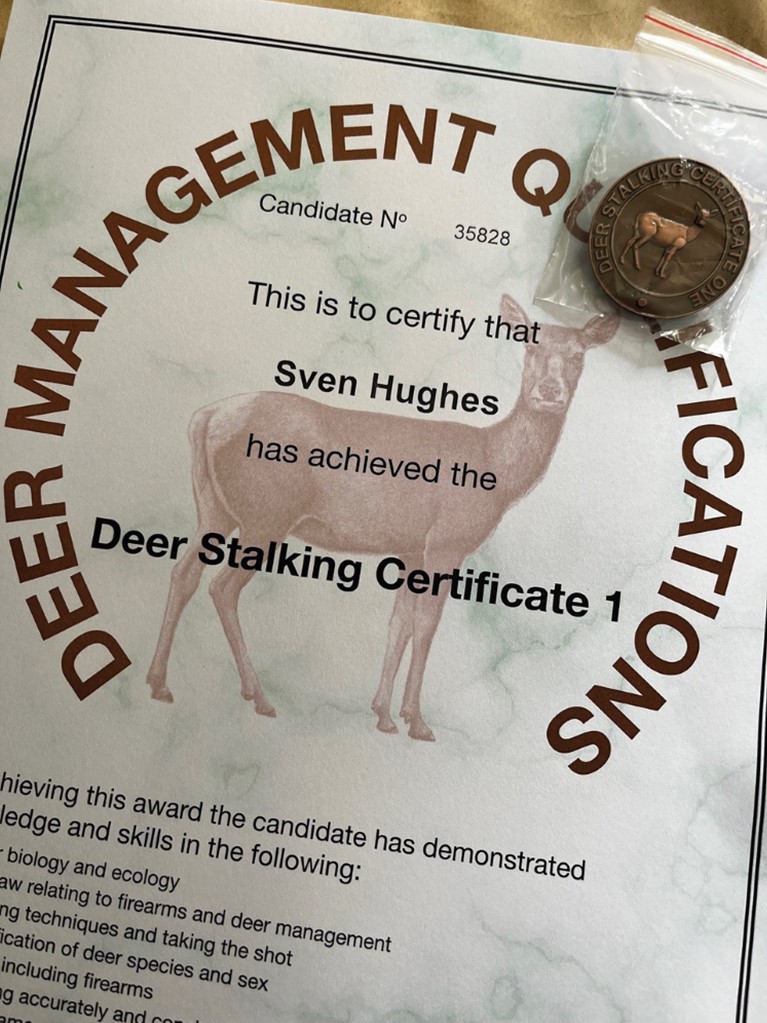
IS IT WORTH IT?
Was DSC1 worth the time and money? Yes, absolutely. The amount of information I learned about all aspects of deer ecology and management was considerable. I came to the course as a rookie and left as a much better informed rookie, with a qualification. Also the increase in my overall confidence as a fledgling stalker was considerable.
For these reasons alone the DSC1 course delivered everything it promised and was worth the investment. However, it was the additional benefits of doing the course that represented its ultimate value. Being able to spend so much focused time, in such intense learning conditions, with such high-quality instructors, truly made the experience everything it was.
The next thing to say is that if I passed the DSC1 course, with my unquestionable lack of previous knowledge and experience, then anyone can. Not because the DSC1 course is easy – it isn’t – but because of the exceptionally high standard of teaching that is provided by the BDS trainers, and because they frequently went well beyond the requirements of the syllabus.
It was clear from the start of the three-day course that our instructors had no intention of simply getting the 16 of us to a sufficient standard to pass the various assessments, but instead wanted to share their fascination and respect for deer, so that we would leave as ambassadors for responsible modern deer management. Perhaps we just hit the jackpot with our teaching team, but even if your course is only half as good the BDS one at Sky Park, it’ll still be worth the money.
So if you are also a novice like me, wondering whether you should enrol yourself on a DSC1 course, then wonder no more. Put simply, my DSC1 experience wasn’t just good – it was sensational.
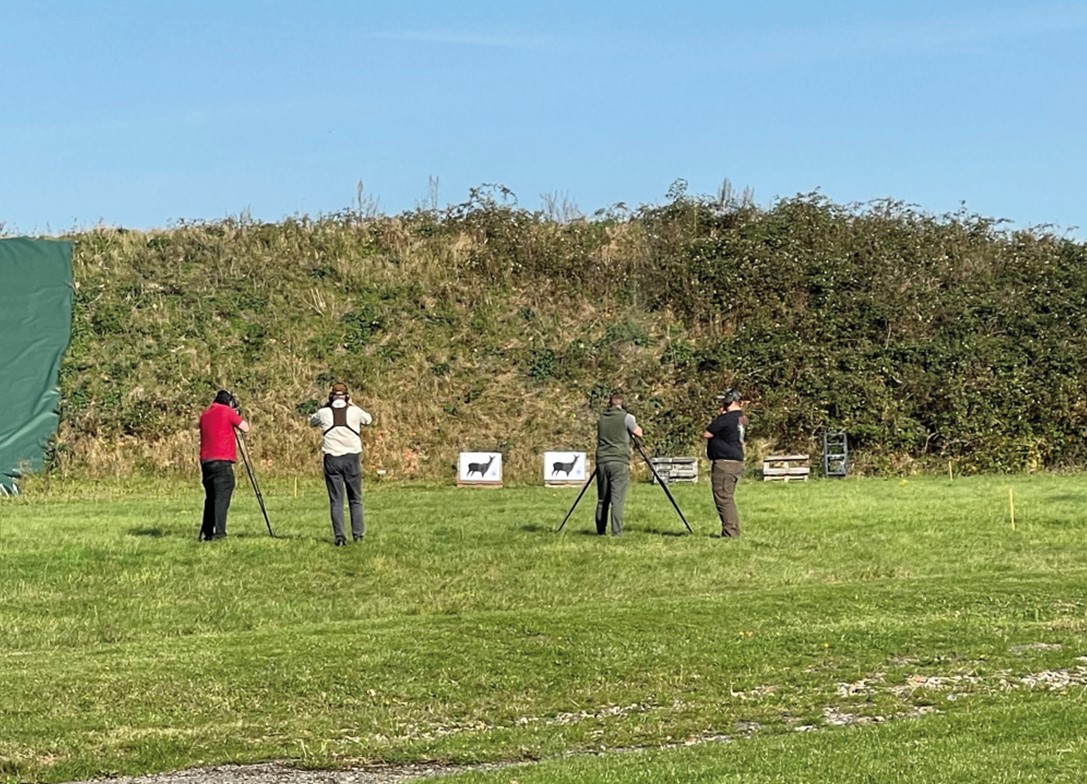
Related Articles
Get the latest news delivered direct to your door
Subscribe to Rifle Shooter
Elevate your shooting experience with a subscription to Rifle Shooter magazine, the UK’s premier publication for dedicated rifle enthusiasts.
Whether you’re a seasoned shot or new to the sport, Rifle Shooter delivers expert insights, in-depth gear reviews and invaluable techniques to enhance your skills. Each bi-monthly issue brings you the latest in deer stalking, foxing, long-range shooting, and international hunting adventures, all crafted by leading experts from Britain and around the world.
By subscribing, you’ll not only save on the retail price but also gain exclusive access to £2 million Public Liability Insurance, covering recreational and professional use of shotguns, rifles, and airguns.
Don’t miss out on the opportunity to join a community of passionate shooters and stay at the forefront of rifle technology and technique.



